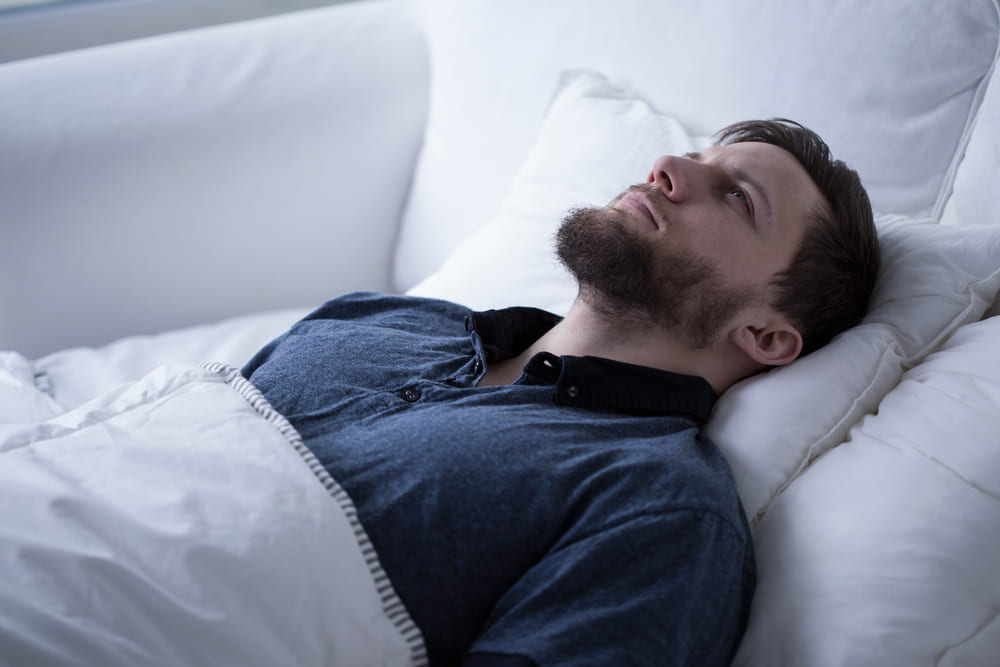Your DNA can significantly impact your sleep health in a variety of ways. It’s important to explore the intricate relationship between genetics and sleep apnea. Understanding how genetic factors can influence your susceptibility, it’s just one part of preventing sleep apnea and managing your sleep health.

What is Sleep Apnea?
Is sleep apnea genetic? Can sleep apnea be genetic, or are there other risk factors? These are all common questions people have when they start to experience problems breathing.
Sleep apnea is a highly prevalent sleeping disorder. People who struggle with sleep apnea repeatedly stop breathing when they sleep. This can lead to:
- Snoring while sleeping
- Morning headaches
- Tiredness throughout the day
- Irritability
- Poor sleep quality
- Problems concentrating during the day
Two types of sleep apnea
There are two forms of sleep apnea:
- Central sleep apnea
- Obstructive sleep apnea
With central sleep apnea, your brain is not properly sending signals to the muscles responsible for breathing. This causes you to stop breathing in your sleep.
With obstructive sleep apnea, the muscles in the back of the throat close, partially or totally, while sleeping, leading to problems breathing.
So, can sleep apnea be genetic? Why does it matter whether you have genetic sleep apnea or not? If you are struggling with sleep apnea, it can increase your risks of secondary health issues like stroke or heart attack. Knowing the cause can help you get the right type of care and change measures within your control to improve your symptoms.
Is sleep apnea a genetic disorder?
Sleep apnea genetic causes have been found in some studies. Researchers theorize about many potential genetic links that are indirect causes of sleep apnea:
- Some genes can impact body weight and where fat gets stored in the body. As such, there could be a genetic link between body fat and sleep apnea. At present, however, there is a significant link between obesity; obese people are ten times more likely to develop obstructive sleep apnea.
- Some genes also determine face size and shape. The placement of the jaw, the size of jaw bones, and the size of the neck can impact the width of an airway, increasing the chances of sleep apnea.
- Genes also impact sleep. Those who have genetic predispositions to other sleep disorders might also be at risk for genetic sleep apnea.

Is sleep apnea genetic?
Several genes are under scientific investigation for a potential link to sleep apnea. Some of the genes under investigation include:
- (ANGPT2)
- (TNFα)
- (PTGER3)
- (LPAR1)
- (GPR83)
- (ARRB1)
- (DRD1)
- (HTR2A)
Obstructive sleep apnea
Research suggests that about 40% of obstructive sleep apnea is because of genetics. The more relatives you have living with sleep apnea, the higher your sleep apnea genetic risk.
While scientists have confirmed there is such a thing as genetic sleep apnea, they don’t exactly know which genes are responsible yet.
Central sleep apnea
There are currently no known genes directly related to central sleep apnea, but some health conditions like heart issues can be genetic contributions.
The interplay of lifestyle and environment
More important though is the other 60%. Non-genetic sources like health and lifestyle provide higher risks.
- Obesity is the biggest factor. As mentioned, people with obesity are ten times more likely to develop sleep apnea, regardless of any genetic influence.
- The use of alcohol and sedatives or opioids can significantly increase your risk of obesity by depressing functions in the central nervous system that control breathing and making it more likely that you will be interrupted while you sleep.
- Environmental pollution or other allergies can exacerbate breathing and disrupt sleep.
- Smoking significantly increases your risk of sleep apnea as well.
- Any type of sleep disorder or factors that contribute to disruptions in sleep can exacerbate symptoms or increase your risk of developing sleep apnea.
Risk factors
Obstructive sleep apnea
Health conditions can exacerbate or trigger sleep apnea, irrespective of genetic links. For obstructive sleep apnea, there are several risk factors:
- Obesity
- Have a smaller lower jaw compared to the upper jaw
- Nasal congestion
- Smoking
- Use of alcohol
- Age
- A family history of sleep apnea
- Thicker necks that enclose the airway
Central sleep apnea
For central sleep apnea, there are several risk factors:
- Age
- History of stroke
- Congestive heart failure
- Use of opioids
So what can you do to offset the risks of a genetic link?

Practical steps if you suspect a genetic link in your family
If you have asked, “Can sleep apnea be genetic” because you suspect there is a genetic link in your family, you might not be able to control your 40% risk of genetic development, but you can certainly control the much more significant, 60% of lifestyle and environmental factors.
Control your weight
The most important thing you can do is control your weight. If you are currently obese, you need to take active steps to integrate higher levels of exercise and daily movement to combat a sedentary lifestyle. Working with your primary care physician can give you access to personalized exercise and nutrition programs that can help you lose weight.
If you are not obese, it’s essential that you keep it that way.
Sleep hygiene
Sleep hygiene is equally imperative. The more you can control your sleeping environment, if there are disruptions you might have. Even if you have a risk of genetic sleep apnea, you can control the symptoms by:
- Going to bed and waking up at the same time
- Keeping your room cool and dark
- Doing light stretches or meditation before bed
Control allergies and pollution exposure
Control any allergies and pollution exposure. If you know that there will be a heavy season of allergens like pollen or other farming pollution in the air, avoid too much strenuous activity outside. Consult with your doctor if you need medication to control allergies. Things like allergy and pollution control can help improve sleep quality and limit your environmental risks.
Avoid smoking, drugs, and alcohol
You should avoid smoking, drugs like benzodiazepines or opioids, and alcohol consumption. If you think that you are struggling with gray area drinking or smoking, you can work with a qualified therapist to practice things like cognitive behavioral therapy in order to help you overcome your addiction.
Summing Up
Is sleep apnea genetic? There is a complex interplay between genetics and sleep apnea. There is potential impact for several genetic factors to influence your sleep health, including cardiovascular genetic conditions, other sleep disorders, and the genetic link for obstructive sleep apnea.
You should prioritize your sleep hygiene, seek professional guidance, and consider other lifestyle and environmental things you can control as part of a comprehensive, holistic approach to sleep apnea prevention and management.



